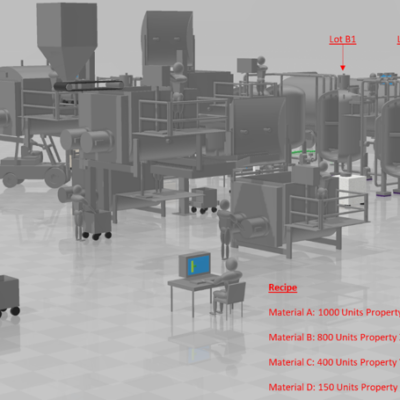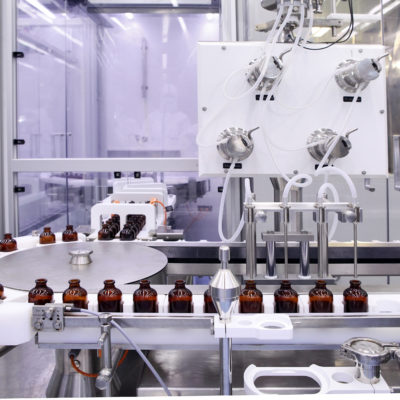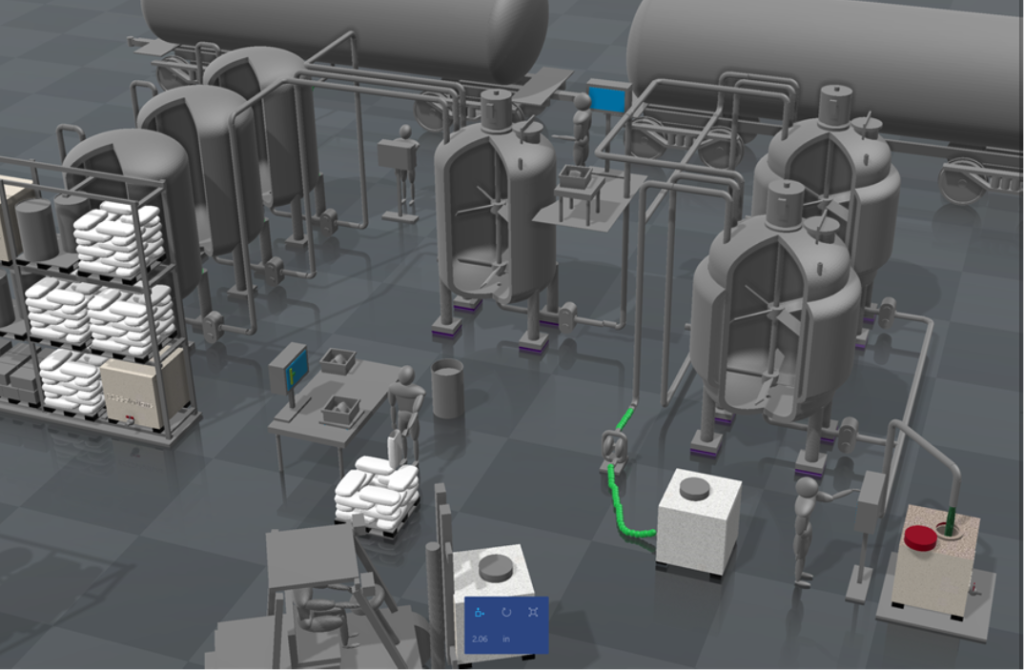News
Surviving the Great Resignation
A rapidly decreasing number of technical personnel are available who can install and maintain the higher-end equipment used in manufacturing today. “The great resignation and/or retirement” movement, along with changes associated with the recent pandemic landscape, has sent many highly qualified workers to the exits in search of new and often altogether different opportunities. The stage has been set for decades with the wave of baby boomer retirements churning towards manufacturers. Parallel to this has been the increased reliance on high-tech manufacturing machines and processes. These two situations pair well with the idea of future-proofing low-to-mid complexity manufacturing but, in an interesting juxtaposition, amplify the core problem. (more…)
Read More | Posted In: Bakery Industry, Beverage Industry, Blogs, Chemical Industry, Food Industry, Life Science Industry, Metals Industry
Case Study: Brewhouse Automation and Functional Upgrade
ECS Solutions was contracted to replace a control system that was becoming obsolete at a brewery in Florida. The Venezuelan-based parent company, for which ECS Solutions employees had already completed multiple projects, was concerned that the automation hardware could go bad and be difficult to replace, leading to a shutdown of the plant. The customer’s production was at risk since the hardware in the system, which incorporated old Siemens PLC, Siemens I/O (input and output), and Siemen’s software, was no longer supported or available.
ECS Solutions has worked at several of the company’s breweries in South America and had demonstrated the functionality of the ISA88 standard, which allows expansion from producing a few items to many and enables changes to be handled by brewmasters in a modular way without reprogramming the control system. The company wanted the brewmaster to be able to create recipes independent of the code in the PLC, so providing the functionality obtained with the ISA88 standard became an important goal. The company wanted the best practices, now working in the facilities in South America, to be introduced into the Florida plant. (more…)
Read More | Posted In: Beverage Industry, Blogs

Batch Forensics: Class-based Unit Coordination Utilizing Link Groups
Take advantage of product functionality to coordinate activities between units.
Read More | Posted In: Bakery Industry, Beverage Industry, Blogs, Food Industry

Batch Forensics: The Case for Procedural Unit Tags
A Unit Tag is a class-based tag that identifies a characteristic of a unit.
The values of these tags are usually associated with information captured via the control systems analog and digital Input cards, signals like Temperature, Weight, Pressure, Level, Conductivity, pH, Level Switch, etc. Other unit tags can contain the status, state, material of construction, or any other user-defined attribute that can enhance the recipe editing capability and execution.
Read More | Posted In: Bakery Industry, Beverage Industry, Distilleries, Food Industry
Batch Forensics: Additional Report Parameters Enhance Process Performance
 Understanding your process performance starts with having unambiguous data that is contextualized. This data provides information that quantifies and qualifies the different aspects that provide insight into the overall system performance. This data ends up in a repository and gets analyzed to produce actionable information and these reports may look at different aspects of the activities required to make products or to clean the equipment. By looking at the process from the ISA 88 and ISA95 point of view, we are able to provide additional context to the information for which the basic activities are reporting.
Understanding your process performance starts with having unambiguous data that is contextualized. This data provides information that quantifies and qualifies the different aspects that provide insight into the overall system performance. This data ends up in a repository and gets analyzed to produce actionable information and these reports may look at different aspects of the activities required to make products or to clean the equipment. By looking at the process from the ISA 88 and ISA95 point of view, we are able to provide additional context to the information for which the basic activities are reporting.
Additional information may be added to provide more insight into the activities related to:
- Quality – (amounts, tolerances, durations, temperatures, lethality, etc.)
- Cost- (materials, energy, personnel, equipment, etc.)
- Material information – (lot ID, material properties, storage locations, etc.)
- Personnel – (who is performing tasks, signoffs, etc.)
- Energy – (transport, heat/cool, mix, etc.)
- Equipment – (raw material source, equipment utilization, portable equipment information.)
– as well as other aspects that can be used to make informed decisions. (more…)
Read More | Posted In: Bakery Industry, Beverage Industry, Blogs, Chemical Industry, Food Industry, Life Science Industry, Metals

Batch Forensics: The Case of the FactoryTalk Batch Timers
Frequently, we hear new and seasoned engineers say they do not use the Rockwell FactoryTalk Batch (FTBatch) Standard timers ($timer) because they cannot interact with them or can’t tell what the timer’s status is, as they do with controller-based timers. However, our Batch Forensic experts explain that this is not the case.
Standard Recipe timers require no design, implementation, testing, commissioning nor validation as required by timer Phases implemented in the controllers. Standard recipe $timers can be applied at all levels of the procedural model (Procedures, Unit Procedures, and Operations) Standard $timers can be used in as many placed as required, each instance of the timer is given a name defined by the recipe author that can be associated with the activity at hand. Timers are automatically added to the units configured on the area model just like the $Null Phase.
Read More | Posted In: Bakery Industry, Beverage Industry, Blogs, FactoryTalk Batch, Food Industry, Life Science Industry

Batch Forensics by ECS Solutions
The term forensics refers to the application of scientific knowledge to problems, especially scientific analysis, and data analysis of physical evidence. In a plant environment, data and scientific analysis can be the key to discovering opportunities to improve the automation solution that exists, forensic tools can be implemented in all phases of the life cycle of a system, but ideally, they should be considered during the design phase.
Read More | Posted In: Bakery Industry, Beverage Industry, Blogs, Chemical Industry, Distilleries, Food Industry, Life Science Industry, Metals

Dosing Materials Based On Their Properties
Improving Product Quality
Often the quantities of materials required to manufacture a product are specified by weight or by volume. Recipes and procedures are created to specify the activities that need to be performed and the number of materials required.
The Setpoints for these quantities are set in the recipes based on the materials that are being used, if the material properties change significantly then these recipe quantities need to be updated once the new materials enter the production stream. This often requires tracking the material consumptions and updating the recipes at the appropriate time. i.e. late at night on Saturday once the new material is introduced to the production environment.
These new formula quantities are calculated after a lab analysis is performed of each Lot sample. The timing to introduce these new recipe parameter values can be critical to the Quality and the Cost of the product.
Read More | Posted In: Bakery Industry, Batch Boosters, Beverage Industry, Chemical Industry, Distilleries, Food Industry, Life Science Industry, White Papers

Documenting Your Manufacturing Ecosystem
Understanding your manufacturing ecosystem is one thing, but documenting it is just as important. Having extensive documentation of the manufacturing ecosystem, helps those who aren’t involved in daily, plant-floor operations make informed decisions. Your manufacturing ecosystem is the system you use for making your product(s), and fully documenting and understanding this ecosystem will help the decision-making process of your organization.
Read More | Posted In: Bakery Industry, Beverage Industry, Blogs, Chemical Industry, Distilleries, Food Industry, Life Science Industry

Material Dosing Geneology
The Food industry uses batch manufacturing extensively and therefore requires traceability for material ingredients, i.e. the ability to follow the movement of a food product and its’ constituents all through the production process.
This capability not only largely prevents unsafe foods from reaching the consumer but also improves product quality and efficiency in the event of a recall.
Read More | Posted In: Bakery Industry, Batch Boosters, Beverage Industry, Chemical Industry, Distilleries, Food Industry, Life Science Industry, White Papers



